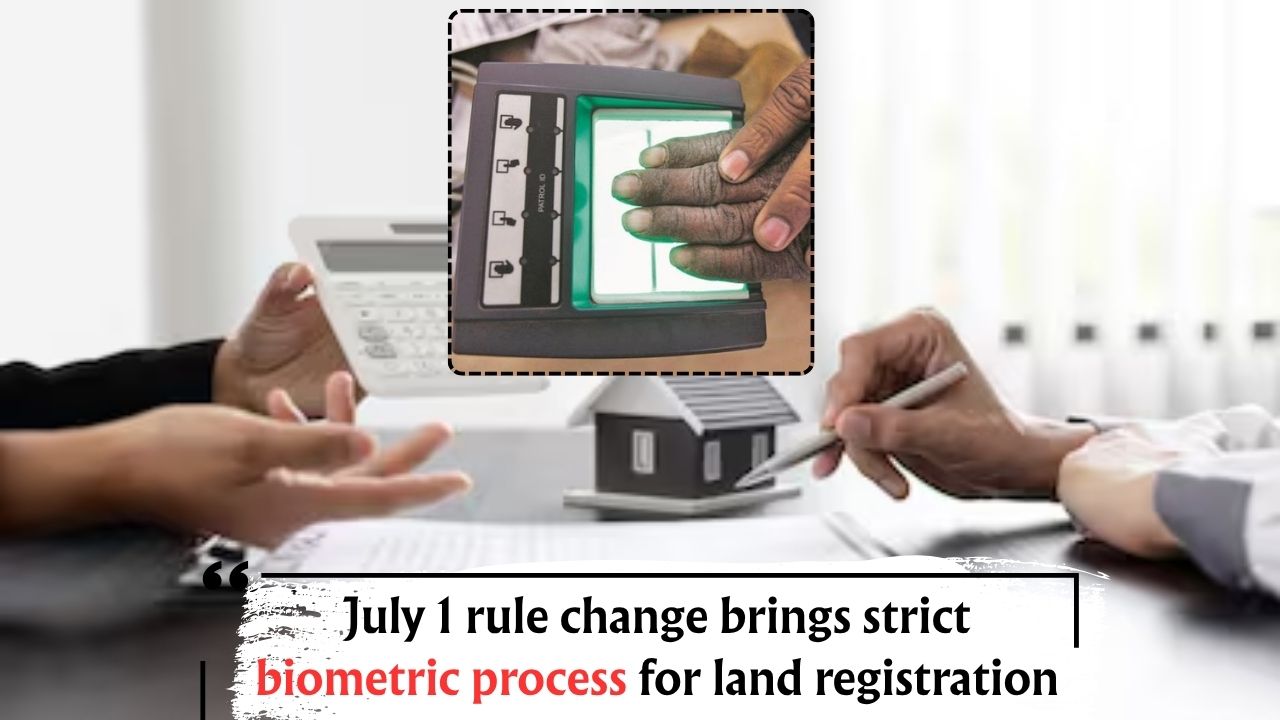New Biometric Rules – Starting July 1, 2025, property buyers and sellers across India will face a digital overhaul in the land registration process. The government has introduced four mandatory biometric rules to enhance transparency and curb fraudulent transactions in real estate. These new rules, which include thumbprint verification and live face scanning, will now be compulsory in all land registry offices nationwide. The reforms are part of a broader move to digitize land ownership, reduce fraud, and make the registration process faster and more secure. Here’s everything you need to know about these landmark changes.
New Biometric Rules Effective from July 1
The government has made biometric verification mandatory for every property transaction. This means your identity must be verified through a physical thumbprint and a live face scan at the time of registry.
Key Highlights of the New System
- All buyers and sellers must be physically present at the registry office.
- Digital biometric verification required before land registration.
- OTP and Aadhaar-based authentication also mandatory.
- Document upload and verification to be done online before appointment.
4 Mandatory Rules Now Needed to Register Land
These four new rules are not optional—they are now enforced at all land registration offices from July 1:
| Rule No. | Requirement | Details |
|---|---|---|
| 1 | Thumbprint Verification | Biometric fingerprint matching with Aadhaar database |
| 2 | Live Face Scan | Real-time facial scan at the registry office linked with UIDAI |
| 3 | Aadhaar-Based OTP Authentication | OTP sent to registered Aadhaar mobile during registration |
| 4 | Pre-Registration Document Upload | All documents must be scanned and uploaded online before visit |
These steps are designed to stop impersonation, protect landowners, and ensure clean titles in all records.
Why This Change Was Necessary – The Hidden Scams
The decision came after thousands of fraud cases involving forged signatures and fake identities were reported in the past year.
Major Issues That Prompted These Reforms:
- Land sold using fake IDs or dead person’s name.
- Unauthorized sales using power of attorney without owner’s knowledge.
- Tampering of property documents and signatures.
- Land grabbing in rural areas due to no digital trace.
With biometric rules in place, impersonation and document forgery will become virtually impossible.
How the New Land Registry Process Works
The land registration process is now fully digitized with step-by-step biometric authentication.
New Digital Registration Flow:
| Step | Task | Description |
|---|---|---|
| 1 | Online Appointment Booking | Select date/time for biometric verification |
| 2 | Aadhaar Verification & OTP | Mobile-linked Aadhaar must be verified |
| 3 | Document Upload | Upload sale deed, PAN, identity proof online |
| 4 | Visit Registrar Office | Appear in person for thumbprint & live face scan |
| 5 | Final Approval and e-Registry | Registration completed and e-copy sent to email |
The entire process takes 1–2 working days if all details are in order.
What Happens If You Fail to Comply?
Failing to follow any of the new rules may result in registration being denied or delayed indefinitely.
Consequences of Non-Compliance:
- Your sale or purchase deed will be rejected outright.
- Any future land claim will be considered invalid.
- You may be flagged for legal verification or fraud.
- Transaction will not be recorded in official land records.
Hence, buyers and sellers are urged to plan well in advance, especially for biometric appointments.
States That Have Already Implemented the System
While the central government is pushing for uniform implementation, some states have already begun adopting these rules:
| State | Status of Implementation | Notes |
|---|---|---|
| Maharashtra | Fully Implemented | Biometric face scan active in all registry offices |
| Tamil Nadu | Phase-wise Rollout | Active in 50% districts as of June 2025 |
| Uttar Pradesh | Testing Phase | Pilot program launched in 3 major districts |
| Karnataka | Fully Active | OTP + biometric system mandatory since May |
| Delhi | Ready for Launch July 1 | Final dry run completed in June |
| Gujarat | Under Implementation | Face scan tech being installed |
| Rajasthan | Not Yet Started | Will follow national mandate from July |
| Bihar | In Preparation | Aadhaar data mapping ongoing |
It is advised to check with your local sub-registrar office for exact requirements before July 1.
Impact on NRIs and Senior Citizens
For Non-Resident Indians and senior citizens, the rules apply equally—but with certain flexibilities.
- NRIs can use embassy-attested biometric verification.
- Senior citizens above 75 can request home biometric appointments.
- Special digital helpdesks will assist elderly and differently-abled individuals.
With land fraud and fake transactions becoming increasingly common, the government’s decision to enforce biometric land registration is a significant step forward. While the new process may seem more time-consuming at first, it ensures long-term protection of land rights and title clarity for all citizens.
5 Frequently Asked Questions (FAQs)
Q1: Can I still register land using Power of Attorney?
A: Yes, but both the owner and the attorney must complete biometric verification in person.
Q2: What if my Aadhaar is not updated with my mobile number?
A: You must update Aadhaar with your active mobile number before starting the process.
Q3: Can I register land from another city or state?
A: No, biometric verification requires in-person appearance at the property location’s registrar office.
Q4: Is this applicable for agricultural land and rural areas?
A: Yes, all types of land—urban, rural, residential, and commercial—are covered under the new rules.
Q5: What documents are required before appointment?
A: Aadhaar, PAN, recent photograph, sale deed draft, electricity or tax bill (as address proof).
